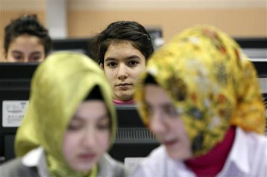Özkök: it's called the Republic of Turkey, not the Turkish Republic
Ertuğrul Özkök in Hürrriyet writes that the speech that the new Chief of the General Staff Hulusi Akar delivered on Victory Day August 30 is the most interesting one in recent years. Reading the speech, I noted many interesting things – the rise of the references to being “Turkish.” The expression “Turk” is mentioned in fourteen different places. The definition of the “Turkish hearth” is made in especially stark terms: The speech states that the battle at Manzikert in 1071 confirmed “Anatolia as the Turkish hearth.” And the most notable expression is the way General Akar refers to our state, as “Turkish Republic.”. I looked up the constitution at the official site of the Grand National Assembly of Turkey: There, the official expression reads “The constitution of the Republic of Turkey…” In our system, in two very important places, the expression “Turkey,” and not “Turkish” is employed: “The Grand National Assembly of Turkey” and “The Republic of Turkey…” And that is indeed very right.
Boratav: is economic crisis going to end the rule of AKP?
Korkut Boratav on the sendika.org site writes that there is a curious expectation among liberal and some leftist circles that Turkey, because it is supposedly one of the most fragile of the emerging markets, faces the threat of the desertion of financial capital as the world economy has become volatile, and that this is supposedly going to bring about the end of the AKP power. First of all, there is no ground for saying that the fragility of the Turkish economy is bound to produce an immediate crisis. Secondly, financial capital is not against the AKP. In the current global economic conjuncture, Turkey is in fact in a more favorable position than the energy exporting economies of the periphery like Russia that are especially hard hit. Turkey on the contrary benefits from the fall of the price of oil, which helps to slow down the growth of its current account deficit; the low budget deficit ensures that Turkish state bonds remain reliable instruments of investment. Chronic vulnerabilities do cause the Turkish economy to slow down during 2015, leading it toward a path of zero growth; however, the expectation of a dramatic crisis erupting before the election does not seem realistic. And what about the political uncertainties that the AKP causes? What about the possibility of Turkey becoming an Islamic fascist regime? Does finance capital care? The AKP’s string of electoral and referendum victories have led finance capital to pour money into the Turkish stock market and into Turkish state bonds.
Laçiner: societal mobilisation needed to save HDP
Ömer Laçiner in Birikim warns that the election campaign for the November 1 election will maybe be Turkey’s historically most violent one – including lynching, mass clashes, and provocations – with the highest number of casualties and incidents ever. The HDP is never going to enjoy the same kind of freedom of action that it enjoyed in the run-up to the June 7 election; that is because the party is going to be under extreme stress, subject to the AKP government’s schemes to criminalize it by mobilizing the “state.” This means that we need another constructive element, which by definition cannot be any of the political parties. A new “subject” has to enter the political equation. This “subject” should be borne out of a movement that conveys the messages of peace, brotherhood, and the feeling of justness to the society, by its own initiative. Such a movement would bring about a societal mobilization that ensures that the Turks among the citizens of the country by their votes make HDP the party that represents the whole of Turkey, this time also in the ethnic proportions of its votes.
Baydar: silencing media to win the election
Yavuz Baydar in Bugün asks, what kind of game is it that is being played openly now with the suffocation of media? The preservation of power depends on the emergence of a three-party parliament at the polls on November 1. An equation of four parties will spell disaster. Thus, it is absolutely necessary on the hand that the HDP is left out of the parliament, and on the other hand, that MHP is undermined and its votes transferred to AKP. In order to achieve these goals, a never before seen manipulation of public opinion is called for. The “silent majority” in Turkey – the lower and middle classes – (at a rate of around 80 percent) follow only the TV channels as sources of information. And note that the efforts of the government to cut the media down to size have always been concentrated on the media groups that have TV channels. Of course, the turn will come to independent newspapers like Cumhuriyet, Taraf, Sözcü and Birgün as well after this. If their attempts to suffocate the media results in a backlash, if the distribution of votes among the parties do not change, the option to postpone these elections is kept as a card in the cupboard.
The Islamization of Turkey: Erdoğan’s Education Reforms
By Svante E. Cornell (vol. 8, no. 16 of the Turkey Analyst)
The growing efforts at Islamization of Turkish society have largely gone unnoticed. For many years, Islamization was the dog that did not bark: in spite of dire predictions by secularists, the AKP did not introduce conspicuous efforts to Islamize Turkey. But since 2011, this has changed. The main exhibit is the education sector, which President Recep Tayyip Erdoğan has remodeled to instill considerably more Islamic content, in line with his stated purpose to raise “pious generations”. Ultimately, the Islamic overhaul of the education system is bound to have implications for Turkey’s civilizational identity, and on the choices it will make on where it belongs politically.



